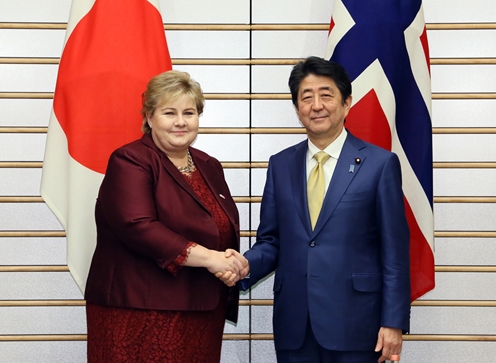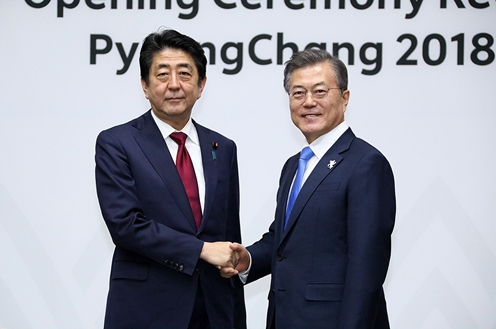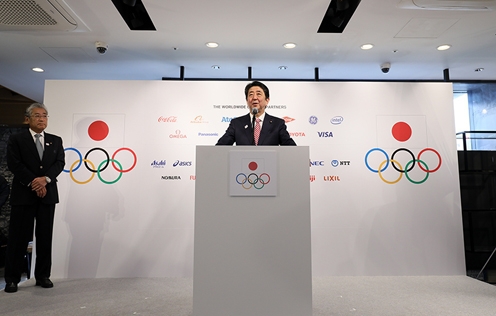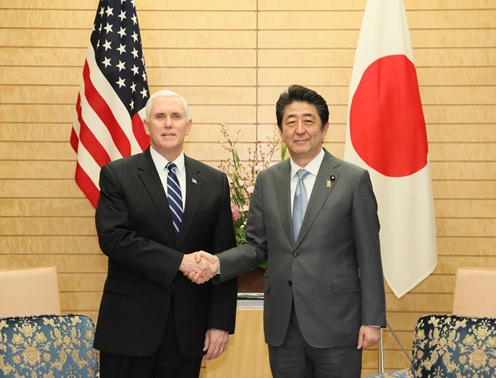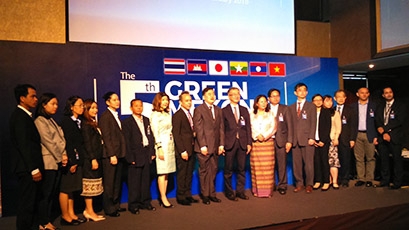Japan-Norway Summit Meeting and Other Events
Cabinet Secretariat, Wednesday, February 14, 2018
[Provisional Translation]
On February 14, 2018, Prime Minister Shinzo Abe hosted a summit meeting and other events with H.E. Ms. Erna Solberg, Prime Minister of the Kingdom of Norway, at the Prime Minister’s Office.
The two leaders attended a salute and guard of honor ceremony, followed by a summit meeting. Thereafter, the leaders held a joint press announcement.
Visit to the Republic of Korea: First Day
Cabinet Secretariat, Friday, February 9, 2018
[Provisional Translation]
On February 9, 2018 (local time), Prime Minister Shinzo Abe visited Yongpyong and PyeongChang in the Republic of Korea (ROK).
Prime Minister Abe held talks with H.E. Mr. Moon Jae-in, President of the ROK. Following that, Prime Minister Abe attended a reception hosted by President Moon, and then participated in a Japan-U.S.-ROK photo session.
Lastly, the Prime Minister attended the Opening Ceremony for the 23rd Olympic Winter Games held at the PyeongChang Olympic Stadium.
Visit to the Republic of Korea: Second Day
Cabinet Secretariat, Saturday, February 10, 2018
[Provisional Translation]
On February 10, 2018 (local time), Prime Minister Shinzo Abe visited PyeongChang and Gangneung in the Republic of Korea (ROK).
Prime Minister Abe offered words of encouragement to Japanese athletes at the PyeongChang and Gangneung Olympic Villages. The Prime Minister attended a reception hosted by the Japanese Olympic Committee (JOC) and others, and then visited the Tokyo 2020 Japan House in Gangneung.
Lastly, the Prime Minister watched a women’s ice hockey event (Japan versus Sweden).
When attending the reception hosted by the JOC and others, the Prime Minister said,
“I am delighted to be able to participate in this reception today, where people supporting the Olympic Games and the sporting world in Japan are gathered.
The PyeongChang Olympics commenced yesterday, and I attended the Opening Ceremony. I would like to express my respect to President Bach of the International Olympic Committee (IOC) and all of the parties involved, and express my hope that these Games will be a success.
There are great expectations that Japanese athletes will win medals in the snow- and ice-based events of these Games. Earlier, I offered words of encouragement to Japanese athletes at the Olympic Villages. The sight of athletes giving their all for their competitions inspires and gives courage to everyone. There are children who see their future selves in the athletes with excitement, as well as people from disaster-affected areas who cheer the athletes on in front of their televisions by making their voice hoarse. Their feelings will carry on from these PyeongChang Olympic Games to the Tokyo Olympic Games to be held two and a half years from now.
The Tokyo Games will be a festive event for all of Japan. Through Host Towns, everyone in Japan will be connected with the world. We aim to have an Olympic Games that will allow people all over the world to discover the many charms throughout Japan. Furthermore, we are steadily implementing Sport for Tomorrow, which I pledged to the world in 2013, in order to promote the value of sports to 10 million people. We can improve our physical and mental wellbeing and contribute toward the realization of a peaceful and better world by overcoming various differences such as culture and nationality, through sports. This is the ideal form of the Olympics and the philosophy of Olympism as proposed by the Baron de Coubertin, an advocate for the modern Olympics. The Tokyo Games that advance these initiatives will not only be a safe, secure, and smooth Olympic Games, but also a Games that will realize the spirit of Olympism to the maximum extent. With the assistance of everyone here today, I hope to achieve the best possible Olympic Games and welcome people from all over the world.
I would like to once again express my respect to everyone who has put in so much effort for the success of these PyeongChang Olympic Games.
As President Takeda mentioned a moment ago, moreover we have here an exhibit showing the beautiful landscapes of Hokkaido and Sapporo which aims to host the Winter Games. Please take a close look at it. We are also joined here by IOC members who I hope will support us.
In any event, I would like to close my remarks by wishing that these PyeongChang Olympic Games will be a success and will inspire and give courage to many people all around the globe, and that we will have a more peaceful world.”
Courtesy Call from U.S. Vice President Pence and Other Events
Cabinet Secretariat, Wednesday, February 7, 2018
[Provisional Translation]
On February 7, 2018, Prime Minister Shinzo Abe received a courtesy call from the Hon. Mike Pence, Vice President of the United States of America, at the Prime Minister’s Office.
After attending a salute and guard of honor ceremony, the Prime Minister and Vice President Pence held a joint press announcement.
Finally, the Prime Minister hosted a dinner banquet at the Prime Minister’s Official Residence, and said in his address,
“The Honorable Mike Pence, Vice President of the United States of America, the Honorable Karen Pence, Second Lady of the United States of America, distinguished guests: It is a great pleasure for me to host this banquet today to welcome Vice President Pence and Mrs. Pence upon their second visit to Japan.
Earlier, I had a very productive discussion with the Vice President on various issues, including the issue of North Korea. Vice President and Mrs. Pence are only spending a short period of time in Japan, so we have prepared a combination of Japanese and Western Dishes because I would like you to enjoy washoku, or Japanese cuisine. Although this is a short visit, I hope you can have a relaxing time.
Vice President Pence has been making every effort to strengthen Japan-U.S. relations for many years, including his two visits to Japan as the Governor of the state of Indiana.
Above all, during his time as Governor, Vice President Pence was dedicated to working on attracting Japanese investment. Thanks to his dedication, many Japanese corporations have advanced into Indiana, including prominent automakers, such as Toyota, Subaru, and Honda. The Japanese people and the people of Indiana share the qualities of diligence, proper discipline, and sincerity. I think that is one of the reasons why Japanese corporations have been able to maintain their businesses for such a long time in Indiana.
Vice President Pence worked on attracting Japanese corporations during his time as Governor and he understands how much the Japanese corporations have contributed to employment and economic development of Indiana. And now, I am pleased that he is the co-chair of the Japan-U.S. Economic Dialogue.
Of course, we understand well that Vice President Pence is very tough when it comes to the Japan-U.S. Economic Dialogue. However, we feel relieved because of his deep understanding of Japan.
The name of Indiana calls to mind the Indy 500, or Indianapolis 500. This is the world’s best auto race, and many Japanese fans have been mesmerized by the circuit where cars over 200 laps totalling 500 miles. To date, many Japanese racing drivers have competed in this world’s fastest circuit race. And on this occasion, I have invited two racers who participated in the Indy 500 to join us today.
I also need to mention the Winter Olympic Games in PyeongChang, which will finally commence the day after tomorrow. Both the Vice President and I will attend the Opening Ceremony. And then, we look forward to the completion for medals that will unfold between the Japanese and American athletes in the events such as figure skating and snowboarding. Of course, the teams we are supporting are different, but I will applaud no matter which one wins..
Today, I have invited distinguished guests who have been working very hard to support today’s excellent alliance between Japan and the United States in facets including business, politics, academia, the arts, and sports as well as those guests who have deep ties with the state of Indiana, where Vice President Pence and Mrs. Pence are from.
So here’s a message that I would like to convey to our guests: Thanks to all your hard work, we now enjoy this excellent alliance. And I’d like to ask for your continued support and efforts. With that, I would like to propose a toast wishing for a great success out of the Vice President and Mrs. Pence’s visit to Japan, as well as for the further development of the bilateral relations between Japan and the United States.”
Signing of the Practical Arrangements between the Ministry of Foreign Affairs of Japan and the International Atomic Energy Agency on Cooperation in the Area of Support to the Implementation of Nuclear Security Measures on the Occasion of the Tokyo 2020 Olympic and Paralympic Games
Foreign Affairs, Thursday, February 15, 2018
1 On February 15 in Vienna, H.E. Mr. Mitsuru Kitano, Permanent Representative and Ambassador Extraordinary and Plenipotentiary of Japan in Vienna, and Mr. Juan Carlos Lentijo, Deputy Director General of Department of Nuclear Safety and Security of the International Atomic Energy Agency, signed the "Practical Arrangements between the Ministry of Foreign Affairs of Japan and the International Atomic Energy Agency on Cooperation in the Area of Support to the Implementation of Nuclear Security Measures on the Occasion of the Tokyo 2020 Olympic and Paralympic Games” in the presence of H.E. Mr. Taro Kono, Minister for Foreign Affairs of Japan, and Mr. Yukiya Amano, Director General of the International Atomic Energy Agency.
2 These Practical Arrangements establish a framework for cooperation , including support for the participation of IAEA experts in events organized in relation to the Tokyo 2020 Olympic and Paralympic Games, exchanges of information related to nuclear security events, the loan of radiation detection equipment, etc.
3 Japan intends to strengthen its cooperation with the IAEA to take all possible counterterrorism measures at the Tokyo 2020 Olympic and Paralympic Games, including preventive measures against nuclear terrorism.
[Reference 1] International Atomic Energy Agency (IAEA)
The IAEA is an international organization established in 1957 for the purposes of promoting the peaceful uses of nuclear energy, preventing the diversion of nuclear energy for military purposes based on the Statute of the IAEA. (It currently has 169 Member States ).
[Reference 2] Practical Arrangements between the Ministry of Foreign Affairs of Japan and the International Atomic Energy Agency on Cooperation in the Area of Support to the Implementation of Nuclera Security Measures on the Occasion of the Tokyo 2020 Olympic and Paralympic Games (outline)
●Scope of the cooperation
・Coordination and organization of technical meetings, as required to implement these Practical Arrangements
・Support to enable IAEA experts to participate as speakers or lecturers in events organized in relation to the Tokyo 2020 Olympic and Paralympic Games;
・The provision by the IAEA of training courses, workshops, seminars, technical visits and exercises related to nuclear security systems and measures for major public events
・The exchange of information related to nuclear security events, as appropriate; and
・The loan of selected types of radiation detection equipment
●Points of Contact : IAEA Secretariat and the Ministry of Foreign Affairs of Japan
●Consultations: consult regularly regarding the activities under these Practical Arrangements.
●These Practical Arrangements are not legally binding.
●The implementation of the activities will be subject to the availability of funds.
●The Parties will not use the names, emblems or flags of the IAEA and Ministry of Foreign Affairs without such prior permission.
●Support the widest possible dissemination while also ensuringthe confidentiality of information.
●Consulting each other as appropriate on issues relating to intellectual property.
●Any disputes arising out of or relating to the interpretation or implementation of these Practical Arrangements will be amicably settled.
●Noting the Agreement on the Privileges and Immunities of the IAEA.
●No modification will be valid unless mutually confirmed.
●These Practical Arrangements will remain valid for a period of 3 years. Either Party may discontinue these practical Arrangements by giving 60 days’ written notice to the other Party.
Signing of the Japan-Armenia Investment Agreement
Foreign Affairs, Thursday, February 15, 2018
1. On February 14 (same day local time), H.E. Mr. Eiji Taguchi, Ambassador of Japan to the Republic of Armenia, and H.E. Mr. Edward Nalbandian, Minister of Foreign Affairs of the Republic of Armenia, signed the “Agreement between Japan and the Republic of Armenia for the Liberalisation, Promotion and Protection of Investment” (Japan-Armenia Investment Agreement) in Yerevan, the capital of the Republic of Armenia.
2. This Agreement aims at further liberalization, promotion and protection of investment between the Contracting Parties. It stipulates the treatments accorded to investment activities and investments when an investor (an enterprise etc.) of a Contracting Party invests in the other Contracting Party, such as national treatment, most-favoured-nation treatment at both of the pre-establishment and post-establishment phases of investments, fair and equitable treatment, prohibition of performance requirements, conditions for expropriation and compensation, freedom of transfers, and procedures for dispute settlements.
3. Armenia has rich human resources in the area of information technology and it is actively introducing preferential treatments for foreign-owned enterprises and establishing relevant legal scheme. Accordingly Japanese companies’ interests in Armenia are increasing, and investment in Armenia is expected to be expanded furthermore. This Agreement is expected to ensure free and stable corporate activities of Japanese enterprises operating in Armenia as well as to contribute to further development of economic relations between the two countries.
4. The Contracting Parties will notify each other, through diplomatic channels, of the completion of their respective internal procedures necessary for the entry into force of this Agreement (in case of Japan, the approval of the National Diet will be required). This Agreement will enter into force on the thirtieth day after the latter of the dates of receipt of the notifications.
Outline of the 5th Green Mekong Forum
Foreign Affairs, Wednesday, February 14, 2018
The Government of Japan and the Royal Thai Government co-hosted the 5th Green Mekong Forum in Bangkok, the Kingdom of Thailand, on February 12. The Forum was co-chaired by H.E. Mr. Arthayudh Srisamoot, Director-General, Department of International Economic Affairs, Ministry of Foreign Affairs of Thailand, and Mr. Fumio Shimizu, Deputy Director-General, Southeast and Southwest Asian Affairs Department, Ministry of Foreign Affairs of Japan.
Participants from Japan and the Mekong countries (the Kingdom of Cambodia, the Lao People’s Democratic Republic, the Republic of the Union of Myanmar, the Kingdom of Thailand, and the Socialist Republic of Viet Nam), United Nations Environment Programme(UNEP), United Nations International Strategy for Disaster Reduction(UNISDR), United Nations Economic and Social Commission for Asia and the Pacific(ESCAP), Asian Institute of Technology and The Asia Foundation exchanged views and experiences. Representatives from Australia, India, the Republic of Korea, United States of America, the relevant organizations and private companies also attended this forum.
In session 1, participants discussed "Sustainable Mekong" (climate change and renewable energy).They pointed out the region's significant vulnerability to climate change and the need for public awareness on renewable energy, information sharing, financing and the capacity building for better access to the existing financing programs, data collection, and integration of climate change adaptation and the disaster risk reduction. The role of new technology and the importance of Joint Crediting Mechanism (JCM) were also highlighted. In Session 2, they discussed "Disaster Risk Reduction and Water Resource Management". In addition to sharing the progress and the experiences on measures taken by each country, they pointed out the importance of integrated water resources management, data sharing, capacity building for data collection and monitoring, building a resilient society through risk sensitive development which composed a basic principal of Sendai Framework for disaster risk reduction, as well as of realizing more integrated cooperation among different initiatives through dialogue.
The attendees and the agencies shared the determination to strengthen the Mekong-Japan Cooperation under the Action Plan for ‘A Decade towards the realization of Green Mekong’ Initiative, with an emphasis on environmental sustainability, inclusiveness and economic growth, in order to tackle the issues related to environment and climate change and to strengthen the connectivity within the Mekong region.
The outcome of this Forum will be reported to the 11th Mekong-Japan Foreign Ministers’ Meeting this year.
JICA President Kitaoka Holds Talks With Nabeel Shaath, Adviser on International Relations to the President of the Palestinian Authority
JICA, Tuesday, February 13, 2018
On February 1, JICA President Shinichi Kitaoka met with Nabeel Shaath, Adviser on international relations to the President of the Palestinian Authority at JICA Headquarters in Tokyo. Mr. Shaath came to Japan as the personal envoy of the President.
The discussion began with Mr. Shaath thanking JICA for its cooperation in Palestine on behalf of Mahmoud Abbas, the President of the Palestinian National Authority. Mr. Kitaoka and Mr. Shaath then discussed the current situation and outlook of Middle East peace and how to further strengthen the relationship.
JICA will continue supporting the peace-building process by promoting the economic and social self-reliance of Palestine.
Japan-Oriented New International Standards for Methods to Measure Characteristics Applied to Regenerative Medical Care Involving Bioceramics Issued
METI, Monday, January 29, 2018
As the worldwide need for regenerative medical care is increasing, the importance of bioceramics* applied to regenerative medical care is increasing.
In light of this trend, Japan submitted a proposal to the International Organization for Standardization(ISO)for the establishment of new standards for methods to measure cell migration in porous materials. In response, the ISO finally issued the new international standards. This establishment will encourage related industries to appropriately measure bioceramics materials with high biological compatibility, a field in which Japan has a strong point in terms of related technologies. It is also expected to enhance the competitiveness of Japanese industries in international markets in the field of regenerative medical care.
1. Background
As the recent arrival of the super-aging population has been driving the worldwide need for regenerative medical care to grow, the importance of bioceramics applied to such care, e.g. artificial bones, is increasing. Japan is a global leader in the field of bioceramic technologies, and to gain international markets, Japanese industries need to secure global trust in such technologies.
Nevertheless, no authorized standard methods have been stipulated for measuring such bioceramics applied to biological compatibility tests, and this causes challenges in the reproduction of bioceramics. Moreover, since these tests require complicated experiments on animals, overseas manufacturers in countries stipulating rigid regulations over such experiments have also been requiring the establishment of international standards for measuring the biological compatibility of bioceramics as an alternative measuring method.
*Note:The term "bioceramics" refers to ceramic materials applied to medical care. Industries in the related fields have been advancing the development and commercialization of those made of materials with high compatibility with biological objects, e.g., hydroxyapatite.
2. Outline of new ISO standard and background to the issuance
Key points of the issued new standards(ISO 19090: Tissue-engineered medical products -- Bioactive ceramics -- Method to measure cell migration in porous materials)are as follows.
The standards stipulate method for measuring the biological compatibility of porous bodies made of bioceramics applied to medical care for bone regeneration.
Specifically, they stipulate testing methods for measuring how well such cells assimilate with the inside of bioceramics so that test operators are able to appropriately measure the biological compatibility of such bioceramics.
Regarding the background to the establishment of the new standards, in April 2013, Japan submitted a proposal to a working group called "ISO/TC150(implants for surgery)/SC7(tissue-engineered medical products)/WG3(tissue-engineered medical products for skeletal tissues)." The ISO/TC150/SC7 is a technical committee engaging in Japan-led activities, the Secretariat of which has been served by Japan. For approximately five years, the technical committee continuously and repeatedly held discussions to coordinate the development of new standards, mainly among expert members from the National Institute for Materials Science(NIMS), the National Institute of Advanced Industrial Science and Technology(AIST), the National Institute of Health Sciences(NIHS), universities and bioceramics manufacturers. As a result, on January 17, 2018, the ISO officially issued new international standards based on Japan’s proposal as the first achievement made by the committee.
In addition to these new standards, Japan will lead international standardization activities in a strategic manner, as seen in its ongoing efforts for the establishment of new standards for quantitative measuring methods of regenerated cartilage, which the ISO is now examining based on Japan's proposal.
3. Expected effects
This new standards will contribute to measurement of ceramics products for regenerative medical care with high biological compatibility in an easy and appropriate method. This achievement is expected to fortify Japan’s competitiveness in international markets in the field of regenerative medical care through exhibiting to such markets the strong points of Japanese products with outstanding technological functions in the field. Moreover, providing simple approaches with medical practitioners and patients in choosing bioceramics with high biological compatibility is expected to decrease the ratios causing physical disorders in patients after their surgery operations and improve the QOL of such patients.
Note:This successful standardization is partly due to the achievements under the Strategic Development of International Standards project(standardization for methods for measuring characteristics applied to regenerative medical care involving bioceramics), which METI commissioned to the private entity.

























